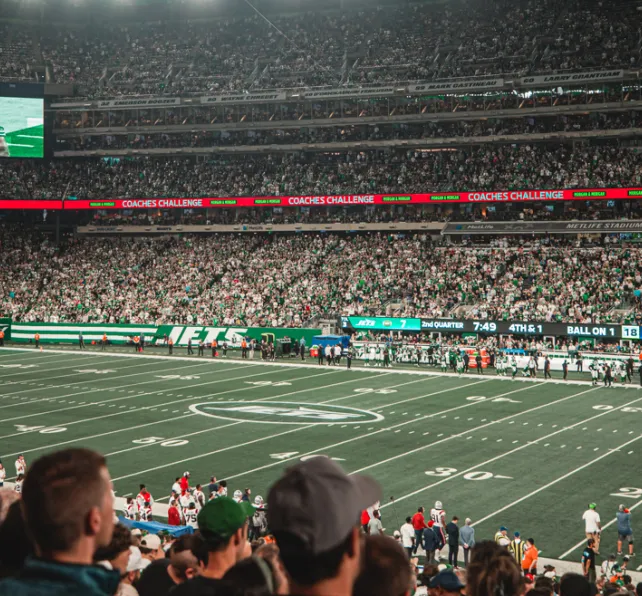Results may vary depending on your particular facts and legal circumstances. The attorney featured above is licensed in Florida. For a full list of attorneys in your state please visit our attorney page.
Fighting for clients and families in New York with the power of America's Largest Injury Law Firm.
Results may vary depending on your particular facts and legal circumstances. The attorney featured above is licensed in Florida. For a full list of attorneys in your state please visit our attorney page.
Personal Injury Lawyers in New York
We’re proud to fight for our neighbors. Meet the attorneys from your community.
Ways We Can Help
Injured in a car accident?
Hurt in a slip and fall?
Injured on the job?
Over 50 Case Types, Like:
View AllSocial Security
Dangerous Drugs
Defective Products
Medical Malpractice
Nursing Home Abuse
Labor & Employment
Truck Accidents
Class Actions
100,000+ Five Star Reviews
The reasons why clients trust Morgan & Morgan.
Based on select nationwide reviews.
Results may vary depending on your particular facts and legal circumstances.
Our Results
Results may vary depending on your particular facts and legal circumstances.
How It Works
Focus on your recovery. We'll take care of the rest.

Submit your free evaluation
Start your claim

Meet your legal team

We fight for more
Results may vary depending on your particular facts and legal circumstances. The attorneys shown in these photos may not be licensed in your state. To find an attorney licensed in your area, please visit our attorney page.
Local Care
Backed by America’s Largest Injury Law Firm.
$25 Billion
Recovered for clients
nationwide700,000+
Clients and families
served1,000+
Attorneys across
the country1
Click may change your life
The attorney featured above is licensed in Florida. For a full list of attorneys in your state please visit our attorney page.
Results may vary depending on your particular facts and legal circumstances.
In the Community
Discover the local Morgan & Morgan experience with news, events, and partnerships.
Learn More
Injured and not sure what to do next? We'll guide you through everything you need to know.
New York Locations
Get answers to commonly asked questions about our legal services and learn how we may assist you with your case.
What should I do immediately after being injured in an accident in New York?
If you’ve been injured in an accident in New York, prioritize your safety and check yourself and others for injuries. Even if your injuries seem minor, call 911 to report the accident and request medical assistance, as some injuries may not be immediately apparent.
Follow any medical advice medical professionals offer, whether on the scene or at a hospital. Follow all recommended treatments and keep detailed records of your medical care. If your personal injury claim goes to trial, your medical records can help establish the full extent of your damages and show that you took your injuries seriously. Most importantly, following the prescribed treatments should help you recover and move forward.
If possible, use your phone to take photos and videos at the accident scene, capturing details such as vehicle damage, road conditions, visible injuries, traffic signals, and any other relevant evidence. Exchange contact and insurance information with the other party involved and gather names, phone numbers, and statements from witnesses who saw the accident.
Next, file a police report. A police report is an official incident record, which can be critical evidence when filing your claim. When speaking to officers, be truthful and stick to the facts.
Then, report the accident to your insurer. Be honest, but avoid admitting fault or making statements that could be used against you later.
Finally, speak to a personal injury lawyer at Morgan & Morgan. Contacting an experienced personal injury attorney as soon as possible can help protect your rights, gather evidence, and navigate the complexities of filing a claim. An attorney will ensure you meet New York’s legal deadlines.
Morgan & Morgan offers free case evaluations to explain your rights and guide you through the next steps.
Why choose Morgan & Morgan’s New York personal injury attorneys?
Choosing the right attorney after an injury is crucial to securing the compensation you deserve.
Morgan & Morgan is the largest personal injury law firm in America, with a proven track record of success. Our New York team combines national resources with local expertise, ensuring we understand the unique aspects of New York law and New York’s courts. With over 35 years of experience and over $25 billion recovered for our clients, we have the knowledge and resources to take on even the most challenging cases.
At Morgan & Morgan, we believe that everyone deserves high-quality legal representation, no matter their financial situation. We operate on a contingency fee basis, meaning you pay nothing upfront and no fees unless we win your case. This structure enables us to advocate for your best interests without adding financial strain.
We understand that dealing with an injury can be overwhelming. Morgan & Morgan’s New York attorneys are committed to providing personalized attention to every client. We keep you informed throughout the legal process, answer all your questions, and are always available to discuss your case. Our attorneys treat every client with respect, compassion, and a dedication to fighting for justice.
Our New York attorneys know the state’s legal landscape, including local courts, judges, and opposing attorneys. This local knowledge allows us to anticipate challenges and tailor our strategy to maximize your chances of success. We know what it takes to win in New York and are ready to put that knowledge to work for you.
At Morgan & Morgan, our motto is “For the People.” We are passionate about fighting for justice on behalf of our clients and ensuring that their voices are heard. Our commitment to client satisfaction is reflected in the positive feedback we receive and the numerous referrals from satisfied clients.
If you’ve been injured in an accident, choosing Morgan & Morgan means selecting a law firm to fight tirelessly for your rights and well-being. Contact us today for a free case evaluation, and let us help you navigate the legal process and secure the compensation you deserve. You don’t have to face this alone—we’re here to support you every step of the way.
How do I know if I have a case under New York State law?
You might be entitled to compensation if you've been injured due to someone else's negligence. We want to ensure everyone can access information and get justice, so you can simply contact Morgan & Morgan for a free case evaluation to learn more about your legal options. Our team can review the details of your situation and advise you on the best course of action.
To have a valid personal injury claim, you generally need to prove that another party’s negligence caused your injuries. This includes demonstrating the following elements:
- Duty of Care: The other party had a legal duty to act responsibly, such as driving safely or maintaining a safe environment.
- Breach of Duty: The other party breached their duty of care through actions or inactions, such as speeding or neglecting to address a hazard.
- Causation: There must be a direct link between the breach of duty and your injuries. You need to show that their actions were the actual cause of your harm.
- Damages: You suffered actual damages, such as medical expenses, lost wages, pain and suffering, or other losses from the accident.
The best way to determine if you have a valid case is to consult with an experienced personal injury attorney. They can assess the details of your situation, gather and review evidence, explain your rights and options under New York law, and guide you through the legal process.
How long after an injury in New York State can I file my claim?
The amount of time you have to file a personal injury claim, known as the statute of limitations, varies by state and the specifics of your case. However, exceptions, such as in cases involving minors, government entities, or when the injury wasn’t discovered immediately, may apply.
It's important to file your claim as soon as possible to preserve your legal rights. Failing to file within the statute of limitations could result in your case being dismissed, meaning you may lose the opportunity to recover compensation for your injuries.
Since deadlines can vary by state and situation, it's best to consult with a personal injury attorney as soon as possible after the incident to understand the specific timeline for your case. An attorney can help ensure your claim is filed correctly and on time.
How much does it cost to hire a New York personal injury attorney from Morgan & Morgan?
Morgan & Morgan’s New York attorneys work on a contingency fee basis, meaning there are no upfront fees or expenses until your case comes to a successful conclusion. That’s right—the Fee Is Free™, and you only pay if we win.
Our fee is a percentage of the settlement or verdict amount, ensuring we are motivated to achieve the best possible outcome for you.
Do I have to pay for a consultation with a New York personal injury lawyer?
No, you do not have to pay for a consultation with a New York personal injury lawyer at Morgan & Morgan. Our personal injury attorneys offer free consultations to potential clients.
If you choose to work with Morgan & Morgan’s New York office, our personal injury lawyers work on a contingency fee basis. You only pay legal fees if your attorney successfully recovers your compensation. If you don’t win, you don’t owe any fees.
What sort of compensation can I recover from a New York personal injury case?
Compensation from a personal injury case may vary widely depending on the specifics of your case, but generally, it may include:
Medical Expenses
You could recover the costs of medical treatment related to your injury, including hospital bills, doctor visits, surgery, physical therapy, prescription medications, and any future medical care you may need.
Lost Wages
If your injury has prevented you from working, you may be entitled to compensation for lost wages. This includes the income you have already missed and any future earnings you may be unable to earn due to your injury.
Pain and Suffering
Compensation for pain and suffering addresses the physical pain and emotional distress caused by your injury. This could include compensation for chronic pain, anxiety, depression, and reduced quality of life.
Property Damage
If the incident damaged your personal property, you may be entitled to compensation for repair or replacement costs. This is especially common in cases involving car accidents, where vehicle damage plays a major role.
Loss of Consortium
Sometimes, your spouse or family members may be entitled to compensation for the loss of companionship, support, and services resulting from your injury.
Punitive Damages
In cases where the defendant's actions were particularly egregious or reckless, you might be awarded punitive damages. These are intended to punish the wrongdoer and deter similar behavior in the future.
Disability and Disfigurement
If your injury has resulted in a long-term or permanent disability or disfigurement, you may be entitled to compensation for the impact on your ability to work and perform everyday activities, as well as the emotional toll of such changes.
Other Related Expenses
You may also recover other expenses related to your injury, such as transportation costs for medical appointments, home modifications needed to accommodate a disability, and the cost of assistive devices like wheelchairs.
Each case is unique, and the compensation you may receive will depend on the details of your injury and the extent of your damages. At Morgan & Morgan, our skilled attorneys will carefully evaluate your case and work tirelessly to secure the full compensation you deserve.
Who will be on my New York case team?
When you hire Morgan & Morgan, you don’t just hire a lawyer; you hire the largest personal injury law firm in the country with an army of over 1,000 lawyers and offices in all 50 states and Washington, D.C.
Your case will be handled by a dedicated team of professionals, including personal injury lawyers, paralegals, and support staff. You will be assigned a care team with a primary attorney overseeing your case and ensuring you receive personalized attention.
When do I meet with my New York lawyer?
After your initial consultation, your care team will schedule regular meetings to discuss your case, provide updates, and prepare you for upcoming proceedings. We are committed to maintaining open lines of communication and keeping you informed every step of the way.
These meetings can occur in person, virtually, or by phone, depending on your case's needs and your availability.
Do you have attorneys in New York who speak multiple languages?
Yes, Morgan & Morgan has a diverse team of attorneys who speak multiple languages, including Spanish. We are committed to ensuring that language barriers do not hinder your access to the legal representation you deserve.
What happens after I submit my personal injury claim in New York State?
After you file your personal injury claim in New York, the at-fault party's insurance company will review it. A claims adjuster will be assigned to your case to review the accident details, analyze documentation, and evaluate the extent of your injuries. The adjuster may collect evidence such as police reports, medical records, witness statements, and other relevant information to determine liability and damages.
The insurance company will carefully review all submitted documentation, including medical records, accident reports, and other relevant evidence. They may contact witnesses, consult experts, or conduct site visits to understand the incident better.
Once the evidence is gathered, the insurance adjuster will assess your claim by evaluating liability and calculating damages. The insurance company will typically present a settlement offer based on this assessment. This offer may be lower than what you expect or require. It is crucial to review it carefully, as it may not fully cover all your damages. If the initial offer is insufficient, your Morgan & Morgan personal injury attorney can negotiate on your behalf to seek a fair settlement that accurately reflects the true value of your claim.
Negotiations can involve back-and-forth communication between your attorney and the insurance adjuster. Your attorney may present a counteroffer based on your assessment of damages, leading to further discussions until a mutually acceptable agreement is reached. You may need to file a lawsuit if negotiations do not lead to a satisfactory settlement.
Will my personal injury case in New York State go to trial or settle out of court?
Many personal injury cases are settled before going to trial. Depending on the circumstances, resolving a case out of court can be a faster, less stressful, and more cost-effective option.
Whether your case settles or proceeds to trial depends on various factors, including the strength of the evidence, the other party’s willingness to negotiate, and your personal preferences. At Morgan & Morgan, we approach every case with the expectation that it may go to trial, ensuring we are fully prepared to fight for the maximum compensation possible. Our attorneys are ready to take your case to court if a fair settlement cannot be reached.
How long does a personal injury lawsuit in New York State take to resolve?
The length of a personal injury lawsuit depends on factors such as case complexity, injury severity, and the parties' willingness to settle. While some cases may be resolved within months, others can take years, particularly if they proceed to trial.
At Morgan & Morgan, our attorneys work diligently to move your case forward as efficiently as possible while ensuring no corners are cut. We will provide you with an estimated timeline based on the specifics of your case and keep you informed of any changes. To learn more, get a free case evaluation today.
How often will I receive updates about my case in New York State?
At Morgan & Morgan, we understand that staying informed about your case is important to you. In New York, our attorneys are committed to keeping you updated regularly throughout the legal process. You will receive updates at key stages of your case, including when there are new developments, when we receive important information, or when decisions need to be made. These updates ensure you are always aware of what’s happening and can make informed choices.
In addition to updates during significant milestones, our team will schedule periodic check-ins to discuss your case's progress, answer any questions, and address any concerns you may have.
You can contact your attorney or case manager if you have questions or need an update outside of scheduled communications. We strive to respond promptly, as open communication is key to a successful client-attorney relationship.
We aim to provide clear and transparent updates, so you always know where your case stands. We are dedicated to guiding you through the process and ensuring you feel supported every step of the way.
¿Usted tiene preguntas acerca de su caso en español?
Los abogados de lesiones personales de Morgan & Morgan entendemos lo importante que es resolver todas sus preguntas legales en el idioma en el que usted pueda entender mejor. Por eso contamos con una sección de Preguntas Frecuentes en nuestra página de abogados.com. Recuerde que en caso de ser victima de un accidente y necesitar ayuda legal, usted cuenta con los abogados de Morgan & Morgan. Siendo el bufete de abogados de lesiones personales más grande de los Estados Unidos, contamos con los recursos y la experiencia que usted necesita para defender sus derechos. ¡La justicia es derecho de todos!

























